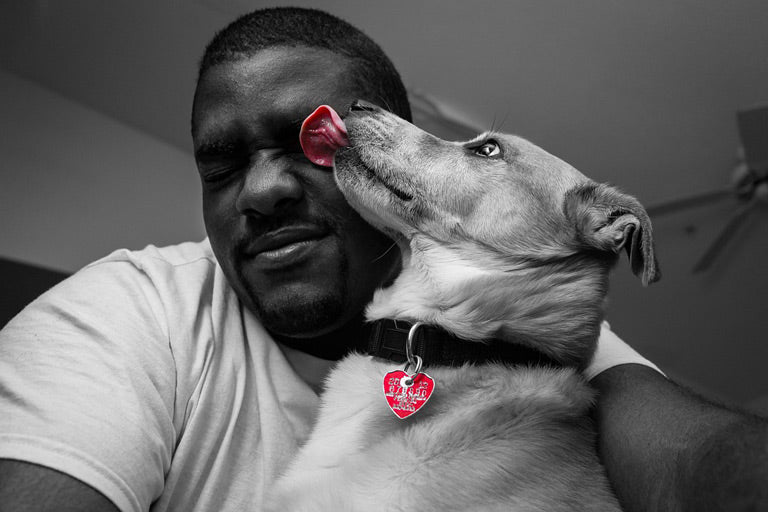
Licking a wound delivers protease inhibitors. If there are any stitches or other wound closures your dogs licking can break down the stitches and cause the wound to reopen.

Theres even some anecdotal evidence that a dog licking the wound makes it feel better.
A dogs lick can heal cuts. Dogs instinctively lick wounds. Something hurts so they lick it. Thats all they can do.
The idea that dogs need to lick wounds in order for them to heal is so pervasive that many people including ancient societies believed that dog saliva can also heal human wounds. When your dog licks a wound there are healing capacities in their saliva and it can also help cleanse the area. They are natural healers when it comes to grooming and cleaning.
It is a part of how they are wired. There is a belief that dog saliva can heal. Yes a dog licking a wound can help it heal faster.
This is because dog saliva actually contains substances that prevent the growth of bacteria. This can be very beneficial in an open wound that is at risk of collecting bacteria. At the very least the dogs licking cleanses the area.
The more a dog licks the more dirt and loose skin will adhere to the saliva on its tongue and be removed from the open sore. Theres even some anecdotal evidence that a dog licking the wound makes it feel better. Sores in the mouth seem to heal quickly and with less scarring than they do elsewhere on the body.
A dog will instinctively lick at a wound but this can seriously delay healing. Therefore you must prevent this by any means possible. Elizabethan collars are the most commonly used protective device.
Other options depending on the location of the wound include covering the wound with a bandage a stockinette a dog coat or a t-shirt. First off there have been studies showing that human saliva does have some healing properties to it so yes it does help facilitate the healing process however the human mouth is one of the most germ ridden places on earth and as such your are likely to get an infection Now if a dog licks your wound for you. Licking wounds seems an instinctual reaction to the injury.
Nobody instructs a child to suck a burned finger and nobody teaches a dog to lick a cut paw. But instinct can be biologically based and often serves a purpose. When a dog licks a wound–or a newborn puppy–it cleans it in much the same way you might clean a counter with a sponge.
How to Stop the Wound Licking Behavior Supervise the Dogs. You can control excessive wound licking by keeping an eye on your dogs. Also you can try.
Another way to stop your doggy from licking its friends wounds is by putting a muzzle on its mouth. You can apply a light loose bandage over the area to prevent licking but it will need to be monitored and changed frequently. Clean the wound with the antiseptic solution two or three times a day and apply the antibiotic ointment until the skin is healed.
The belief that dog saliva can heal human wounds dates all the way back to ancient Egyptian times when dogs were used in healing practices. The Egyptians believed that being licked by a dog especially on an open wound would aid in recovery or even cure the disease causing the illness. Thanks to all the antimicrobial and healing properties weve looked at your dogs saliva can actually benefit wound healing to a certain degree.
Studies in rats and mice showed that wound contraction and healing happen more quickly in rats with normal salivary glands compared to rats that can no longer produce saliva. It is a good idea to stop a dog from licking a wound of any sort because licking and chewing can slow healing by reopening wounds. If there are any stitches or other wound closures your dogs licking can break down the stitches and cause the wound to reopen.
Run cool water on the wound for 5-10 minutes once or twice a day. You can use the faucet or a hose. If the dog is small enough to use the kitchen sink the little spray hose that many kitchens have works very nicely.
Dry the wound and apply topical medicine to promote healing. Calendula officinalis in gel cream oil or ointment form promotes healing and is antimicrobial. The simple mechanical action of a dogs tongue can be helpful in dealing with a wound.
The saliva of a dogs tongues acts to loosen any debris that may be on the surface of the wound. The benefits of moderate wound licking. The enzymes in dog saliva help destroy the cell walls of dangerous bacteria.
Lactoferrin and other antibacterial and anti-viral compounds can also be found in saliva. Licking a wound delivers protease inhibitors. It is a misconception that a dogs saliva is somehow antibacterial or will promote healing of a wound and it only takes a few minutes of licking or chewing for a dog to pull out their stitches and reopen their wound or to introduce infection.
Both these things warrant another.